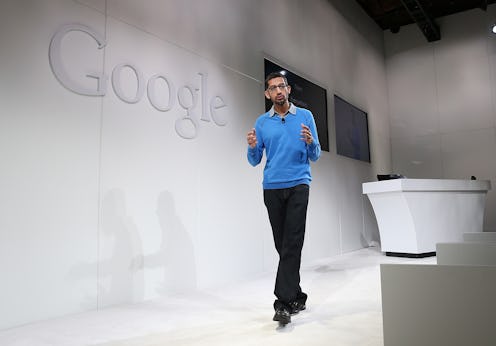News
Google's Next Step In World Domination
So while we were all distracted by the idea of Amazon's cool flying drone delivery service, Google was actually making some stealthily futuristic moves of its own — and they were big. The tech company announced Friday that it had acquired Boston Dynamics, an engineering company that has designed machines for the Pentagon and is known for its iRobot-esque inventions.
If you're not familiar with Boston Dynamics' impressive range of inventions, then you should spend more time on YouTube. The company has uploaded several videos of its robots, including Petman, a human-like robot that can squat and do calisthenics; Rise, an insect-like machine can climb vertically; and Cheetah, a robot which can move as fast as 28 miles per hour.
”We are looking forward to this next chapter in robotics and in what we can accomplish as part of the Google team,” said Boston Dynamics co-founder Marc Raibert.
Though the robotics company has had customers ranging from all branches of the U.S. Armed Forces to private-sector companies, it's currently under a multimillion dollar contract with the U.S. Defense Advanced Research Projects Agency (Darpa) to supply a group of humanoid robots to take part in Darpa's Robotics Challenge. The two-year-long competition — which comes with a cool $2 million prize at the end of it — is looking to create robots that would help in disaster situations, and able to handle tasks like driving a car, cleaning up debris, and cutting through walls. Only this week, NASA revealed its own submission to the contest: the 6 foot 2 inch tall Valkyrie, which kinda looks like Ironman, but also kind of looks like a Starship Trooper (incidentally, it may be going to Mars).
This isn't the first robotics company Google has bought. In fact, in the last six months alone, the tech conglomerate has acquired a total of eight robotics companies, some of which have been behind the making of robotic limbs and computer vision. Wondering why? It remains unclear, actually. But the whole initiative is being led by Andy Rubin, the exec who was in charge of developing Android technology.
Considering that Google's executive Chairman, Eric Schmidt, once told The Wall Street Journal that "Most people don't want Google to answer their questions...they want Google to tell them what they should be doing next," the idea of the tech conglomerate slowly amassing autonomous systems is kind of creepy. Then again, the idea of having some sort of butler Googlebot doing all my holiday shopping for me sounds pretty great.
